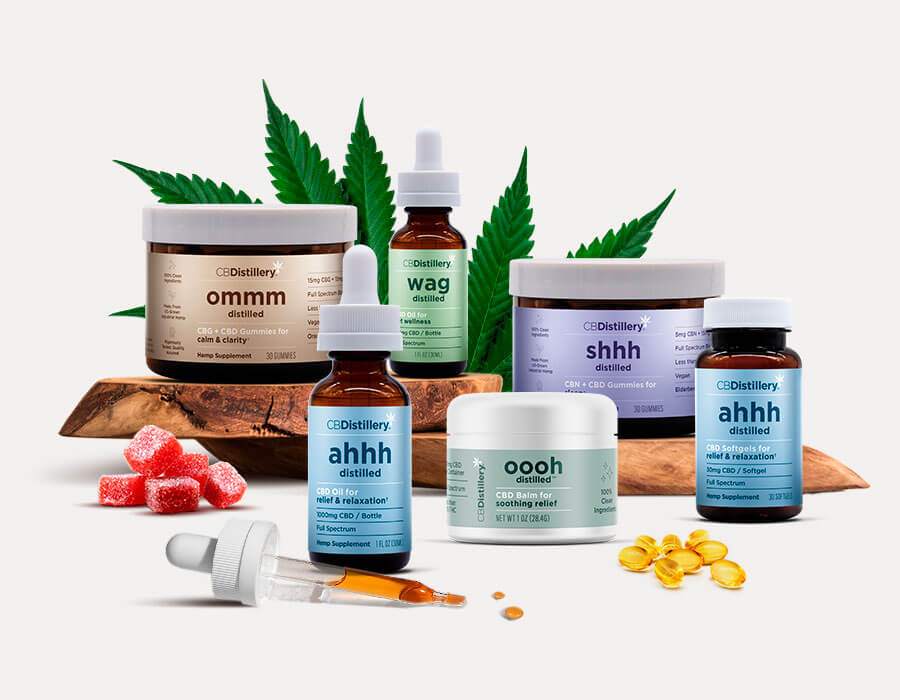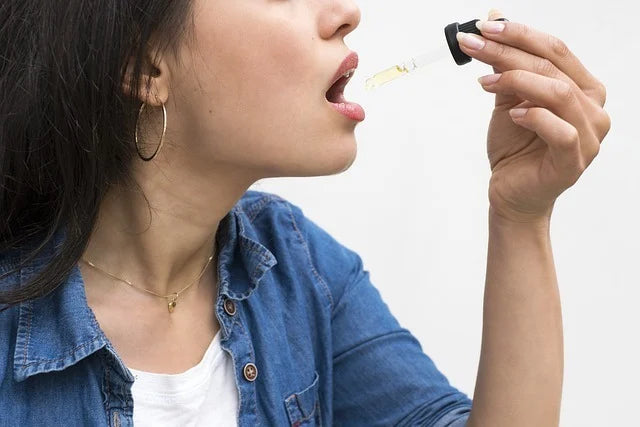Written by Michael Wright
With any supplement, it’s reasonable to ask how long you’ll enjoy the benefits of your product—and that includes CBD. The duration of time that you can feel the effects of CBD depends on a number of factors, including the strength of your CBD product, the type of CBD product you’re using (CBD edibles vs. vapes and so forth), and your own personal bioavailability factors. So, there isn’t a black-and-white, all-encompassing answer regarding the duration of CBD effects and benefits, but there are answers to be found, if you know what to look for.
In this article, we’ll examine what CBD is and discuss how the different types of CBD products interact with your body, and the difference in their effects. Let’s begin with a quick primer on everyone’s favorite cannabinoid: CBD. (Fair play, for some it’s THC!)
What Is CBD?
CBD (cannabidiol) and THC (tetrahydrocannabinol) are both natural compounds that are derived from the cannabis plant, called cannabinoids. The 100-plus cannabinoids present in cannabis help the plant to stave off grazing animals, insect predators, and inclement weather, as well as attract pollinators. In short, cannabinoids are crucial to the life of the cannabis plant.
Strange as it may seem, cannabinoids can also be beneficial to our health.** Turns out, animals also produce cannabinoids, which are called endocannabinoids, and are part of a cell-signaling system called the endocannabinoid system. This system helps the various systems and organs of the body to maintain homeostasis, or balance. This, in turn, helps the body to regulate such crucial functions as sleep, memory, mood, pain, stress, motor control, appetite, and more.
When you consume CBD and other cannabinoids, they interact with those same receptors, bolstering your endocannabinoid system and helping your body to maintain a healthy balance.**
How Long Does CBD Stay in Your System?
So, how does the CBD in your CBD product get to your endocannabinoid system, anyway? Well, it depends on the type of CBD product you’re using. That method of delivery not only determines how long it will take for your CBD to take effect, but also how long you experience the effects (and enjoy the benefits!) of your CBD oil product.
Before we get into the various CBD products, it’s important to note that everyone’s experience with CBD can be different. We all have different body compositions, metabolisms, and CBD (or THC) tolerance. This differing rate and speed of CBD absorption is referred to as “bioavailability.” We all have different bioavailability when it comes to CBD, so how a CBD gummy affects your friend might not reflect how that same CBD chew affects you. With this in mind, the timelines we provide below are generalized. Your own experience may differ.
CBD Gummies & Other CBD Edibles
Edibles, such as CBD gummies and capsules, take the longest period of time to enter your bloodstream, but they also deliver the longest-lasting effects of any CBD products. This is because the CBD must first pass through your digestive system before being absorbed into the bloodstream. In general, this can take between 30 minutes and two hours. This means that you generally have to wait longer to feel the effects of CBD with edibles than with other types of products. On the plus side, the effects of CBD edibles generally last much longer than other products: often between six and eight hours!
Sublingual CBD Oils
Sublingual CBD oils are tinctures that are held beneath the tongue (for about a minute), where the CBD is absorbed through the corpuscles of the mouth. This generally takes between 15 and 30 minutes, and the effects of these CBD oil tinctures can last from four to six hours. Sublingual CBD tincture products are a great middle ground between long-lasting CBD edibles and quick-hitting CBD vapes.
CBD Vape Products
Speaking of CBD vapes, did you know that vaping CBD or THC allows you to experience the effects of these cannabinoids quicker than any other type of product? That’s right: When you inhale vapor from a CBD vape juice, the CBD enters your bloodstream through the lining of your lungs, which can take just a few minutes or even seconds. The downside is that the effects of a CBD or THC vape max out at around an hour or two.
CBD Creams and Other CBD Topicals
CBD creams, balms, and other topicals are absorbed differently than other CBD products. Instead of being absorbed into the bloodstream, CBD topicals are absorbed through the skin, where the CBD travels directly to the affected area of muscles or joints. You should feel the soothing effects of your CBD cream within 15 minutes to an hour. Those effects should last three or four hours.
CBD Product Comparison Chart
Here’s a handy chart showing you the different types of CBD products, including the time it generally takes to feel their effects, as well as how long they last. Remember, all times are on average. Your experience may differ!
| Type of product | Starts working in … | Effects last … |
| CBD edibles | 30 minutes to two hours | Six to eight hours |
| Sublingual CBD oil | 15 to 30 minutes | Four to six hours |
| CBD vapes | A few minutes | One to two hours |
| CBD topicals | 15 minutes to one hour | Three to four hours |
CBD & Drug Testing
Got an upcoming drug test and wondering how long CBD lasts in your system? Well, first of all, drug tests aren’t scanning for CBD. They’re scanning for THC, which can appear in small traces in some CBD products, depending on what type of CBD oil is used in your hemp-based product.
Full spectrum CBD can contain up to 0.3% THC, as measured by dry weight. Broad spectrum CBD has all detectable traces of THC filtered out, though it may still contain minute, undetectable traces. Over the course of time, the trace amounts of THC in these types of CBD products can build up in your system and could potentially produce a false positive test result for THC, even if you’re only using legal hemp products. CBD isolate, by the way, is CBD only with no other cannabis content present, including THC.
So, let’s say you have a drug test coming up and you’re worried that the CBD products you’ve been using have been building up traces of THC in your system. How long do you have to wait until you’re in the clear? Well, that depends on the type of test you’re taking. Here’s a look at the different types of drug tests.
Urine
Urine testing is very common in workplace drug screenings. In general, tetrahydrocannabinol can be detected for three days with this kind of test, though that can stretch up to six weeks with heavy usage. Fifty (50) nanograms of THC-COOH (one of THC’s primary metabolites) per milliliter will prompt a positive urine test.
Hair
Hair testing is uncommon, but some employers will use it because it can detect THC down to one picogram (roughly one trillionth of a gram) per milligram. THC can be detectable by hair testing for up to 90 days.
Blood
Blood tests are less common in workplaces, because employers are generally more interested in detecting habitual drug use. Blood cycles out tetrahydrocannabinol fairly quickly, so these tests are better for detecting drugs at the time of impairment (police will often use this type of drug test). THC can be detected in blood for up to seven days.
Saliva
Saliva testing isn’t commonly used. It can detect THC for roughly 72 hours after consumption (longer for habitual use). There aren’t any established cutoff limits for detecting THC via saliva drug test, though four nanograms per milligram is a probable standard.
Here’s a handy chart showing how long THC is detectable by various types of drug testing. Please note that these numbers are not absolutes, and bioavailability factors can affect the results of your test.
| Type of drug test | THC is detectable … |
| Urine | Up to 3 days (6 weeks with heavy usage) |
| Hair | Up to 90 days |
| Blood | Up to 7 days |
| Saliva | Up to 24 hours |
The Shelf Life of CBD Products
Based on the title, some of you may have clicked on this article wondering, “How long does CBD stay good?” (It is kind of a vague blog title, isn’t it?) Well, like anything organic, CBD ages. Over the course of time, oxygen, light, and heat all take their toll. Since CBD is photoreactive (that is, light changes it), it can degrade over time. CBD also oxidizes when exposed to air. In addition, whether your CBD product is an edible, like gummies, or an oil, there are other ingredients that also get old and expire.
There are a couple of things you can do, as a consumer, to make sure you’re taking a CBD supplement that is still good. First, make sure you shop with a brand you can trust. There are a lot of fly-by-night CBD brands out there selling substandard products which may not have an accurate expiration date on the label. So, always go with a CBD brand with a good reputation in the industry, like CBDfx. Also, check your label. The expiration date should be prominent. Generally, unopened CBD products that have been stored in a cool, dry place can last from one to two years, depending on the product.
Speaking of storing CBD products, make sure to store your CBD oil, CBD gummies, or other CBD products in a cool, dry place, away from direct sunlight. And make sure your item is stored in a sealed container, to minimize or eliminate unnecessary oxidation. This will extend the shelf life of your CBD product.
Final Thoughts
We hope this article has given you a better understanding of how CBD works, particularly when it comes to the effects and benefits of different types of CBD products. It’s important to pay attention to the type of CBD being used, as well as the method of consumption. This way, you’ll have a more accurate expectation of your overall CBD experience. We wish you all the best on your CBD journey!



